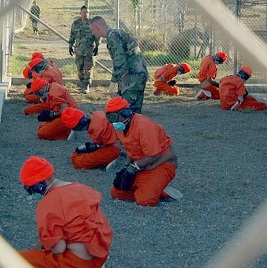Guantanamo: Past the Point of All Shame
By David Swanson

U.S. high schools should teach courses on Guantanamo: what not to do in the world, how not to make it even worse, and how not to compound that catastrophe beyond all shame and recovery.
As we tear down Confederate statues and continue brutalizing victims in Guantanamo, I wonder if in 2181, had Hollywood still been around, it would have made movies from the perspective of Guantanamo’s prisoners while the U.S. government commited new and different atrocities to be bravely confronted in 2341.
That is to say, when will people learn that the problem is cruelty, not the particular flavor of cruelty?
The purpose of the Guantanamo prisons was and is cruelty and sadism. Names like Geoffrey Miller and Michael Bumgarner should become permanent synonyms for the twisted dehumanizing of victims in cages. The war is supposedly over, making it difficult for aging men who were innocent boys to “return” to the “battlefield” if freed from the Hell on Earth stolen from Cuba, but nothing ever made sense. We’re on President #3 since promises were first made to shut Guantanamo down, yet it moans and rattles on, brutalizing its victims and their captors.
“Don’t Forget Us Here” is the title of Mansoor Adayfi’s book about his life from age 19 to age 33, which he spent in Guantanamo. He could not be seen as the youngster he was when first kidnapped and tortured, and was seen instead — or at least the pretense was made — that he was an important top anti-U.S. terrorist. That didn’t require seeing him as a human being, quite the opposite. Nor did it have to make any sense. There was never any evidence that Adayfi was the person he was accused of being. Some of his imprisoners told him they knew it was false. He was never charged with any crime. But at some point the U.S. government decided to pretend he was a different top terrorism commander, despite the lack of any evidence for that one either, or any explanation of how they could have captured such a person accidentally while imagining that he was someone else.
































